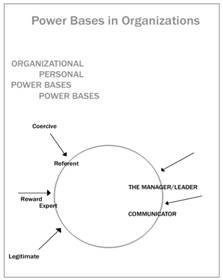
Power
Bases in organizations - Costs and Benefits of
Using Power
Communication and Impact Oriented Programme Management

See aslo
Effective leaders tend
to blend position and personal powers and
understand how each influences and expands the other.
Leaders use the power of their position when they hire, evaluate,
discipline, transfer, demote or terminate people in the organization. Leaders use personal
power when they direct, instruct, facilitate, explain, coordinate, delegate, support, or
give and get feedback.
There are several
effects and consequences of the five types of social power outlined above.
To begin, for all five
types of power, the stronger the basis of power, the greater the power. As illustrated in this slide, power can be based in
organizational roles and in personal actions and attributes.
Second, for any type of
power, the degree of influence may vary greatly, but in general, Referent Power will have
the greatest range influence.
Third, coercion results
in less liking of the person and perhaps greater resistance. Reward Power results in
increased attraction and low resistance.
Fourth, the more
legitimate the influence attempt, the less likely it will produce resistance and
likeability. After all, sometimes a manager
has to make tough decisions that require adherence from subordinates, but the decision is
respected and followed when it is fair and without malice.
Reward and coercive
power require surveillance. You must be able
to monitor employees sufficiently to know when rewards or punishment need to be given and
if orders are being carried out.
Finally, power always
resides in the receiver who has the choice of going along with an influence attempt.
Fourth, the more
legitimate the influence attempt, the less likely it will produce resistance and
likeability. After all, sometimes a manager
has to make tough decisions that require adherence from subordinates, but the decision is
respected and followed when it is fair and without malice.
Reward and coercive
power require surveillance. You must be able
to monitor employees sufficiently to know when rewards or punishment need to be given and
if orders are being carried out.
Finally, power always
resides in the receiver who has the choice of going along with an influence attempt.
See Politics, Power, and
Influence
Evaluating
“Power and You”
Now that
you have read about the types of social power, return to the results of the activity
“Power and You” and assess the kind of power you tend to prefer. You may transfer your totals below.
Notice
that columns a-e relate to reward, coercive, legitimate, referent and expert power,
respectively. Your lowest number indicates
your favorite choice and visa versa.
Totals _____a
_____b _____c
_____d _____e
Reward
Coercive
Legitimate
Referent
Expert
Now that you understand the nature of power, how would you, or would you, change
the way you try to influence others?
Balancing management
and leadership functions clearly requires the use of all five forms of social power. The question is not whether to use any of these
five types of power; but, rather, the question for a leader-manager is when and why should
certain types of power be exercised and how might I go about exercising my authority in
the most appropriate ways. In what follows,
you are given a cost-benefit analysis of using each type of power:
Coercive
power
Benefits |
Costs |
· Effective
for gaining obedience · Appropriate
for disciplinary actions · Achieves
quick results |
· Drains
physical and emotional energy from user · Lowers
task satisfaction of followers · Harms/destroys
trust and commitment · Becomes
less effective over time (must be repeated with greater force) |
Reward
power
Benefits |
Costs |
· Culturally
sanctioned · An
effective attention-getter for group priorities · Can
enhance cooperation and a sense of self-worth · Can
serve as an effective motivator |
· Lower task
satisfaction than with expert and referent power · Not
consistently linked with high task performance · Escalating
financial and material costs to provide higher and higher tangible rewards to offer · Some groups
have limited tangible rewards to give · Ineffective
if rewards are neither desirable nor attractive or if the wrong individuals are rewarded |
Legitimate
power
Benefits |
Costs |
· Culturally
sanctioned · Inorganizationals
the weight of the whole organization · Effective
in gaining obedience |
· Lowers
follower task performance · Lowers
follower task satisfaction · May become
less effective over time |
Expert
power
Benefits |
Costs |
· High
follower task satisfaction · High
follower task performance · Drains
little, if any, emotional energy from user |
· Takes a
long time to develop · Must posses
the necessary knowledge and skills · Not as
effective in gaining obedience as coercion, reward or legitimate power, particularly in
the case of misbehavior · May not be
effective if follower do not share the leader’s goals |
Referent
power
Benefits |
Costs |
· High
follower task satisfaction · High
follower task performance |
· Takes a
long time to develop · Can
diminish if overused · Must
possess the necessary knowledge and interpersonal skills · Not as
effective in gaining obedience as coercion, reward or legitimate power, particularly in
the case of misbehavior |
Effective leaders,
including change leaders, will likely need to influence using all five types of power. The two forms of power that have the most positive
effect on performance and satisfaction are expert and referent power. There are times, however, when one will need to
discipline using coercive power. It is also
important to note that the combination of legitimate, referent and expert power will allow
a leader to exert significant influence.
A leader-manager is
also someone who is seen as credible by both internal and external stakeholders.